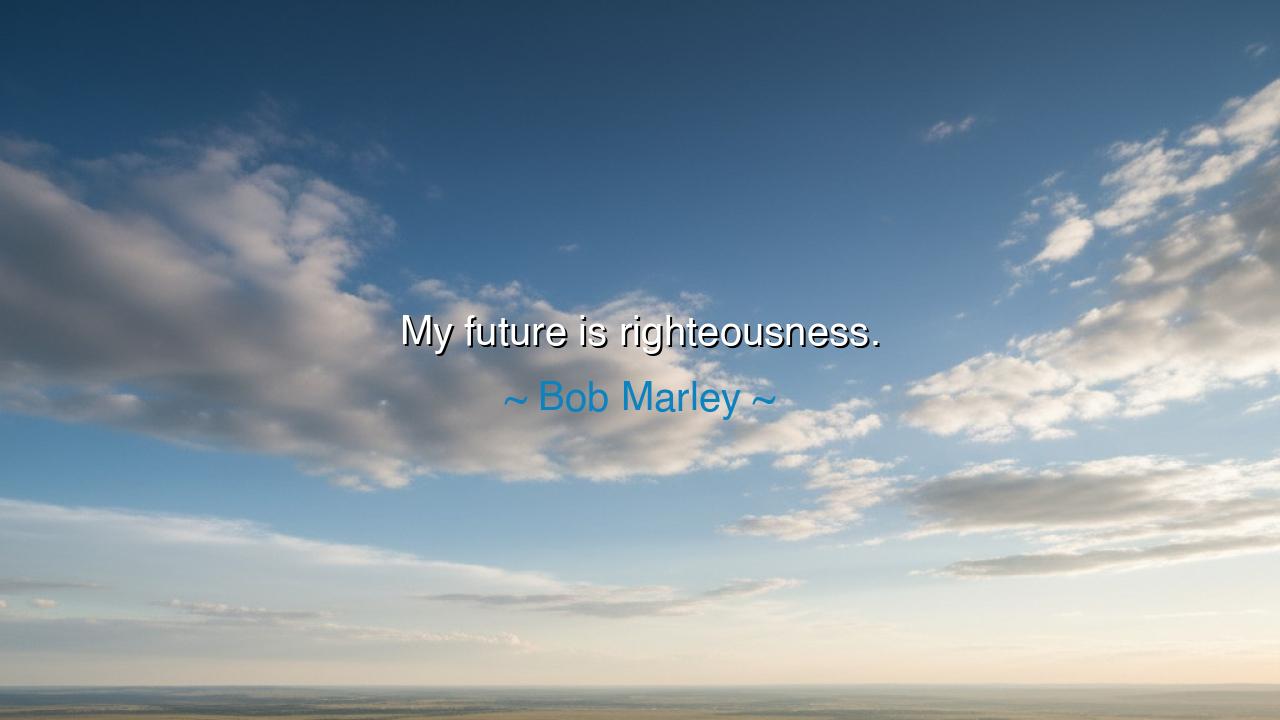
My future is righteousness.






On the Path of Righteousness and the Eternal Future of the Soul
When Bob Marley declared, “My future is righteousness,” he was not speaking of fame, wealth, or legacy — but of destiny. His words are simple, yet they carry the weight of prophecy. To say that one’s future is righteousness is to reject the illusions of the material world, to see beyond the fleeting glitter of success, and to root one’s purpose in what endures beyond time itself: truth, virtue, and the divine. In this statement lies a reflection of Marley’s deepest philosophy — a belief born from his Rastafarian faith, from his reverence for justice, and from his unyielding love of humanity.
For Marley, the future was not merely a time yet to come, but a direction of the soul. His was a vision steeped in spiritual understanding — that righteousness is not something found by chance, but something built, step by step, through the choices one makes in the present. He saw life as a journey toward alignment with divine will, a continual cleansing of the heart and mind until they harmonize with love, peace, and truth. In a world full of corruption, greed, and oppression, to declare “My future is righteousness” is an act of rebellion — a bold refusal to let darkness define one’s destiny.
The origin of these words lies deep in the soil of Marley’s roots. As a man of Jamaica — a land marked by struggle and survival — he saw firsthand the divisions that wealth, power, and hatred create. Yet rather than despair, he chose faith. Influenced by Rastafari, he believed that every person is a temple of the divine, and that to live rightly is to live in harmony with Jah, the living God. Righteousness, to Marley, was not a rigid morality, but a way of being — a balance between spiritual devotion and earthly compassion. His music, his actions, even his humility, all pointed toward this truth. His future, he understood, was not in worldly recognition, but in eternal alignment with the higher order of life.
History is filled with those who, like Marley, saw righteousness as their future — those who walked the hard road of integrity when the easier path of compromise lay before them. Consider Nelson Mandela, who endured decades in prison yet refused to surrender his vision of justice. When he emerged free, he sought not vengeance, but peace. His future, too, was righteousness — not in the form of triumph over his enemies, but in his triumph over hatred itself. Or Mahatma Gandhi, who wielded no weapon yet conquered an empire with truth and steadfastness. Such souls remind us that the true measure of a life is not what it accumulates, but what it stands for.
Bob Marley’s words are also prophetic when seen in the light of his own passing. He died young, yet his spirit continues to echo through generations. His message of love, unity, and justice has outlived his mortal frame — proof that righteousness, once chosen, is immortal. Those who live for greed are buried with their possessions; those who live for righteousness live forever in the memory of the world. Marley knew this. That is why he could look beyond death and say, “My future is righteousness.” He understood that what we build in spirit cannot be destroyed.
In our own lives, this teaching calls to us like a song from the hills. It tells us to look beyond the shallow rewards of ambition, and to seek the deeper joy of integrity. To live in righteousness is not to be perfect, but to strive daily toward truth — to act with kindness when it is hard, to speak truth when silence would be safer, to choose love when hatred seems easier. The world will tempt us with power, but power fades; it will tempt us with pleasure, but pleasure passes. Only righteousness endures.
The lesson, then, is both simple and profound: Build your future not with gold, but with goodness. Let every act you do, every word you speak, every thought you nurture, be aligned with justice, compassion, and truth. The future, after all, is not something that happens to us — it is something we create through our choices in the present. Like Bob Marley, let us stand firm in the belief that righteousness is not only the way, but the destination.
For in the end, kingdoms fall and songs fade, but righteousness — the light of the heart in tune with the divine — is eternal. Let that be your future, as it was Marley’s: a life not measured by what you possess, but by the peace and goodness you leave behind. For when your path is righteousness, your soul has already found its forever home.






AAdministratorAdministrator
Welcome, honored guests. Please leave a comment, we will respond soon